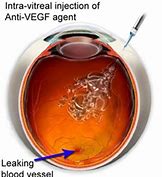Endocrine Conditions
Conditions
Allied Support
Intravitreal Eye Injection
Knowledge is Power.
True/False - Quiz: Do You Understand Intravitreal Eye Injection Treatments?
Information - Intravitreal Eye Injection Treatments
 Intravitreal eye injections of anti-VEGF medications may be used to treat diabetic macular edema, diabetic retinopathy, branch or central vein occlusion and age-related macular degeneration. The inside of your eye is filled with vitreous, a jelly-like fluid. Your ophthalmologist will inject medicine into the vitreous found at the back of the eye near the retina to protect and hopefully improve your vision.
Intravitreal eye injections of anti-VEGF medications may be used to treat diabetic macular edema, diabetic retinopathy, branch or central vein occlusion and age-related macular degeneration. The inside of your eye is filled with vitreous, a jelly-like fluid. Your ophthalmologist will inject medicine into the vitreous found at the back of the eye near the retina to protect and hopefully improve your vision.
Types of Anti-VEGF Medications
Your eye doctor will determine which of the three anti-VEGF drugs are the best treatment for your condition: bevacizumab, ranibizumab or aflibercept. All three drugs are potent and effective, with different capacities, that may be more indicated in a particular patient’s disease state.
What to Expect During the Procedure
 You’ll receive your intravitreal eye injections at the ophthalmologist’s office, and the procedure will take between 15 and 30 minutes. The doctor will dilate your pupils, use topical anesthesia and place a speculum in your eye to administer the intravitreal eye injection. Patients are often concerned that an injection of material into their eye will be a painful or scary procedure. In fact, after the first or second injection, patients become quite at ease with the idea that they will have these injections, and they are motivated by the fact that they do often see improvement of their visual acuity very quickly after these injections are started. You may feel pressure during the procedure, but not pain.
You’ll receive your intravitreal eye injections at the ophthalmologist’s office, and the procedure will take between 15 and 30 minutes. The doctor will dilate your pupils, use topical anesthesia and place a speculum in your eye to administer the intravitreal eye injection. Patients are often concerned that an injection of material into their eye will be a painful or scary procedure. In fact, after the first or second injection, patients become quite at ease with the idea that they will have these injections, and they are motivated by the fact that they do often see improvement of their visual acuity very quickly after these injections are started. You may feel pressure during the procedure, but not pain.
Following an intravitreal injection, you may feel pressure or grittiness in the eye, slight bleeding on the white of the eye and floaters in your vision. These are temporary and normal. When ophthalmologists began to inject patients for diabetes, vein occlusion and macular degeneration, they believed it would be a one- or two-year process. However, studies have shown that the average is 24 months, and some patients need to extend lifelong treatment.
Talk to your eye doctor if you'd like more information on intravitreal eye injections.
Visit HealthChoicesFirst.com for more videos and resources on eye diseases and surgery.
Print this Action Plan and check off items that you want to discuss with your healthcare provider
-
Intravitreal eye injections of anti-VEGF medications may be used to treat diabetic macular edema, diabetic retinopathy, branch or central vein occlusion and age-related macular degeneration.
-
Your eye doctor will determine which of the three anti-VEGF drugs are the best treatment for your condition: bevacizumab, ranibizumab or aflibercept
-
You’ll receive your intravitreal eye injections at the ophthalmologist’s office, and the procedure will take between 15 and 30 minutes.
-
Patients are often concerned that an injection of material into their eye will be a painful or scary procedure. In fact, after the first or second injection, patients become quite at ease with the idea that they will have these injections,
-
Following an intravitreal injection, you may feel pressure or grittiness in the eye, slight bleeding on the white of the eye and floaters in your vision. These are temporary and normal.


